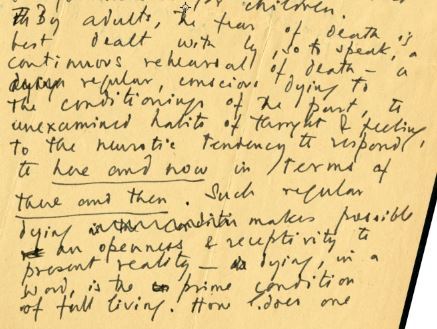Appreciation of Mortality
When asked to confront the reality of death, how does one react? Sandburg’s inquiry, “Why not forget about death?” presents one response; on the other hand, quite at odds with Sandburg's proposal, Aldous Huxley's writes to Mrs. Kaderli that “the fear of death is best dealt with by, so to speak, a continuous rehearsal of death.” That is, rather than banishing the fear to the farthest reaches of the mind, we must actually condition ourselves to the process of dying. This proposal is not as morbid as it seems; rather, the kind of “conditioning” that Huxley suggests is an appreciation and awareness of the constant passage of time, and the small deaths that appear at every moment. He continues, “Such regular dying makes possible an openness and receptivity to present reality— dying, in a way, is the prime condition of full living.” His philosophy is similar to that of “live and let go.” We can better appreciate the present reality and the value that it holds when we recognize that it is part of a finite, temporal process that is unfolding over time; past events and experiences are valuable precisely because they are no longer part of the present. Nussbaum elaborates on the value of an awareness of finitude:
"The intensity and dedication with which very many human activities are pursued cannot be explained without reference to the awareness that our opportunities are finite, that we cannot choose these activities indefinitely many times. In raising a child, in cherishing a lover, in performing a demanding task of work or thought or artistic creation, we are aware, at some level, of the thought that each of these efforts is structured and constrained by finite time. And the removal of that awareness would surely change the pursuits and their meaning for us in ways that we can scarcely imagine — making them, perhaps, more easy, more optional, with less of striving and effort in them, less of a particular sort of gallantry and courage" (Nussbaum, 1989).
When Huxley speaks of the “prime condition of full living,” perhaps he has in mind the kind of living that Nussbaum writes here, in which our pursuits and their meanings are informed by our constant rehearsal of finiteness, of death. Huxley ends with the parting sentiment, “fond dying is the condition of fond living, and the final fond dying is a consummation of a lifelong process.” Thus, he presents a different perspective on the role of dying at the end of life. Instead of death being something that has been kept at bay through living a good life, acknowledged only in one’s final hours, in this picture, death has been held close, culminating in its final embrace, the end of a life well-lived.
It is important to note that, while not as vocal as his brother Julian, a known eugenicist, Aldous Huxley also defended a kind of eugenics ideology (Woiak, 2007). Consequently, it is necessary to be highly critical of his recommendations to embrace death. However, we can salvage from his perspective articulated in the Kaderli letters the real insight that modern societies have instilled a fear of death that stunts life and makes it difficult for us to talk about the end of life with any openness or honesty. It is possible to relate to death otherwise than paranoiacally.
